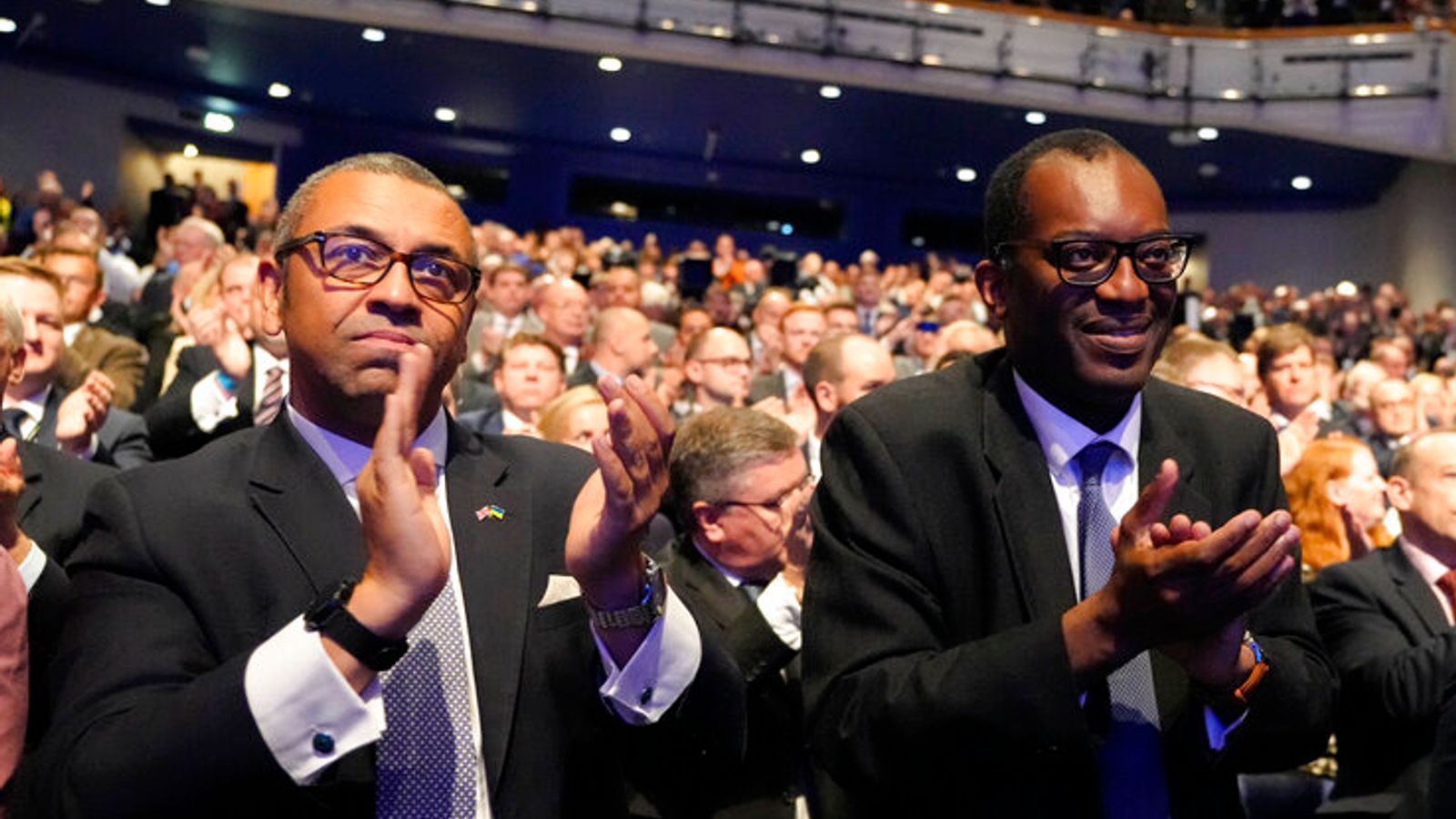Foreign Secretary James Cleverly refuses to commit to mini-budget tax cuts ahead of chancellor Kwasi Kwarteng’s financial statement

The foreign secretary has refused to commit to the government seeing through all the tax cuts proposed in the chancellor’s contentious mini-budget.
James Cleverly told Sky News “the package the chancellor put forward is pro-growth and is the right answer”.
He refused to rule out further changes, however, dodging multiple questions on whether the government will stick with its plan to scrap the rise in corporation tax.
Asked if there will be no more reversals of policy, Mr Cleverly told Kay Burley: “The chancellor is making a statement on the 31 October which gives a more holistic assessment of the public finances and our response to the global headwinds that every democracy, every economy in the world is facing.
“But as I say, the foundations of that mini-budget, protecting people from energy bill prices, letting people keep more of their earnings, protecting businesses from those energy prices, making sure we are internationally competitive, all those things are really key for the growth agenda the PM is putting forward.”
Truss is out ‘and we have the numbers’, says Tory MP – politics latest
Probed again on whether the government will be sticking to its tax-cutting mini-budget, the foreign secretary replied that “ultimately, that mini-budget was about protecting tens of millions of people from unaffordable energy prices”.
Pressed specifically on the government’s plan to axe the increase in corporation tax from 19% to 25% in April, Mr Cleverly said: “Well, I mean the chancellor will come to the dispatch box…”
The foreign secretary added it is “absolutely right” the government helps businesses to “stay competitive” and “stay afloat”.
Advertisement
“We have got to make sure we can compete internationally with the other places businesses can choose to locate. We have got to make sure we are tax-competitive.”
Prime Minister Liz Truss faces open revolt in her party over the government’s £45bn package of unfunded tax cuts, which unleashed chaos in the markets after it was announced last month.
Ms Truss and Kwasi Kwarteng, the chancellor, have said the cuts are needed to get Britain’s economy growing again, as data published on Wednesday suggested the country is heading for recession.
Please use Chrome browser for a more accessible video player
2:54
How long can Truss stay in power?
Mr Kwarteng will meet with International Monetary Fund (IMF) leaders in Washington DC today, after the institution’s chief economist said tax cuts threatened to cause “problems” for the UK economy.
The IMF has said Britain’s priority should be tackling inflation rather than adding to the price problem through tax giveaways to achieve economic growth.
The prime minister and her chancellor have already been forced into reversing one of the many tax-cutting policies within their plan – scrapping the 45p tax rate for the highest earners.
In her first PMQs since the mini-budget last month, Ms Truss yesterday pledged not to cut public spending to balance the books – despite a leading economics-focused think tank warning the government is billions short of the sums needed.
The Institute for Fiscal Studies has warned the government would have to cut spending or raise taxes by £62bn if it is to stabilise or reduce the national debt as promised.
On Wednesday, Mel Stride, the Tory chairman of the Commons Treasury Committee, said that given Ms Truss’s commitments to protect public spending, there was a question over whether any plan that did not include “at least some element of further row back” on the tax-slashing package can reassure investors.
Please use Chrome browser for a more accessible video player
1:32
Tories must ‘get back to being fiscally responsible’
“Credibility might now be swinging towards evidence of a clear change in tack rather than just coming up with other measures that try to square the fiscal circle,” Mr Stride warned.
Read more:
What on earth is happening in UK markets?
What are bonds and where do they fit in the mini-budget crisis?
While David Davis, the Tory former minister, called the mini-budget a “maxi-shambles” and suggested reversing some of the tax cuts would allow Ms Truss and Mr Kwarteng to avert leadership challenges for a few months.
Please use Chrome browser for a more accessible video player
52:31
The Take: Is the PM boxed in?
The foreign secretary later warned Tory MPs against attempting to replace Ms Truss as prime minister.
“Changing the leadership would be a disastrously bad idea not just politically but economically,” he told BBC Radio 4’s Today programme.
Mr Cleverly also rejected an attack by former Tory leader Sir Iain Duncan Smith – who described Bank of England Governor Andrew Bailey as “stupid”.
“Of course he is not stupid. You don’t get to be governor of the Bank of England if you are stupid,” the foreign secretary told Sky News.
“The job of the Bank of England is to intervene. He is doing his job. It doesn’t mean we always agree with everything the Bank of England governor says or does.”